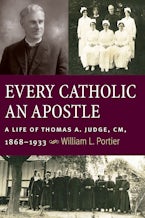Preparing your PDF for download...
There was a problem with your download, please contact the server administrator.
Every Catholic An Apostle
A Life of Thomas A. Judge, CM, 1868–1933
Imprint: Catholic University of America Press
Born in Boston of immigrant parents, Thomas A. Judge, CM (1868-1933) preached up and down the east coast on the Vincentian mission band between 1903 and 1915. Disturbed by the "leakage" of the immigrant poor from the church, he enlisted and organized lay women he met on the missions to work for the "preservation of the faith," his watchword. His work grew apace with, and in some ways anticipated, the growing body of papal teaching on the lay apostolate. When he became superior of the godforsaken Vincentian Alabama mission in 1915, he invited the lay apostles to come south to help. "This is the layman's hour," he wrote in 1919. By then, however, many of his lay apostles had evolved in the direction of vowed communal life. This pioneer of the lay apostle founded two religious communities, one of women and one of men. With the indispensable help of his co-founder, Mother Boniface Keasey, he spent the last decade of his life trying to gain canonical approval for these groups, organizing them, and helping them learn "to train the work-a-day man and woman into an apostle, to cause each to be alert to the interests of the Church, to be the Church." The roaring twenties saw the work expanded beyond the Alabama missions as far as Puerto Rico, which Judge viewed as a gateway to Latin America. The Great Depression ended this expansive mood and time and put agonizing pressure on Judge, his disciples, and their work. In 1932, the year before Judge's death, the apostolic delegate, upon being appraised of Judge's financial straits, described his work as "the only organized movement of its kind in the Church today that so completely meets the wishes of the Holy Father with reference to the Lay Apostolate."
William L. Portier is in the Department of Religious Studies, University of Dayton and author of Divided Friends: Portraits of the Roman Catholic Modernist Crisis in the United States (CUA Press)
"Every Catholic an Apostle is an important and helpful book, one that makes a unique contribution to our understanding of Fr. Judge's life as well as ecclesial development, canon law, religious life, the ordained, and law apostolates…It is a long book, at 536 (excluding end matter). It is, however, engaging, as Dr. Portier hoped: A long but, I pray, not tedious, book (6). This book is recommended for theology and religious studies scholars, especially historians and those who specialize in practical theology; libraries; and, of course, the religious congregations involved."
~Yount, Mary Beth, Horizons: The Journal of the College Theology Society
"This is a very timely book. Father Judge’s vision of the Church’s mission in 1909 corresponds closely to what we now call the ‘new evangelization.’ He was consumed with zeal—‘charity at white heat,’ he called it--for the preservation of the Catholic faith among those who were at risk of losing it. He had a heart for baptized Catholics who did not know God’s love and who lived far from Christ and from the Church. Decades before Vatican II, he saw the importance of preparing laymen and women as ‘apostles’ (today’s ‘missionary disciples’) to embrace their baptismal vocation and take their own responsibility for the Church’s mission. This story of Father Judge’s labors, and of the intrepid faith and confidence in God that sustained him through many trials and setbacks, is important. It belongs to the legacy of the Catholic Church in the United States and Puerto Rico, and it deserves to be known. -"
~Sister Sara Butler, MSBT, S.T.L., PhD, Professor Emerita of Dogmatic Theology, University of St. Mary of the Lake, Mundelein, Ill., Member, International Theological Commission (2004-2014)
"Thomas A. Judge, CM/ST, a son of St. Vincent de Paul, enkindled in the twentieth century an apostolate of the laity. From the concept of the Confraternity of Charity/Ladies of Charity of St. Vincent flowed the Missionary Cenacle Apostolate (lay apostolate). Not unlike his spiritual father, from the mind of Fr. Judge also evolved the Missionary Servants of the Most Holy Trinity (priests and brothers) and the Missionary Servants of the Most Blessed Trinity (sisters). Every Catholic an Apostle encapsulates the power for good that Fr. Judge created in the Missionary Cenacle family. Sentire cum Ecclesiae(think with the Church) endowed his missionary family with the dynamism to do ordinary actions with love and faith."
~John W. Carven, CM, Provincial Archivist of the Eastern Province of the Congregation of the Mission
"Portier develops Judge’s story in relation to myriad contexts the missionary faced: the relationship between mission and church, between Catholic and other Christian communities who reached out to immigrants and the underserved, lay mission, and the 'nationalization' of Catholics in the United States. He unfolds the role of devotion and scripture in relation to mission, catechetical instruction, and their connections with social work. The story provides an interface of Christian missionaries from various denominations in the southern region of the United States and provides an example of how particular religious movements interact with larger social, political, and national developments."
~Church History


